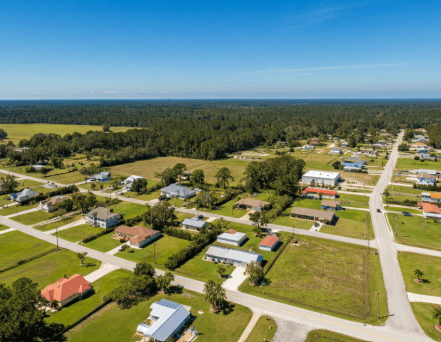Did you know that residential areas make up 61.25% of the land in Florida, while industrial and retail uses account for nearly 24% each? Understanding the different types of land uses in Florida, is crucial for anyone looking to invest, develop, or explore opportunities in this growing community. With a blend of agricultural, commercial, and residential zones, offers a unique landscape for ventures of all kinds. Steve Daria and Joleigh, renowned real estate investors and cash land buyers, have years of experience navigating this diverse market and can provide valuable insights. Whether you’re eyeing a residential plot, industrial space, or commercial development, they’re here to help. Don’t miss the chance to uncover how you can benefit from the different types of land uses in Florida. Book a free discussion today with Steve and Joleigh to turn your vision into reality!
Key Points
- Residential Land Use: Over 61% of Florida land is designated for residential purposes, making it ideal for single-family and multi-family homes. This zoning promotes community living while ensuring the provision of proper infrastructure and amenities for residents.
- Agricultural Land Use: Significant portions of Florida are allocated to agricultural zones, promoting sustainable farming and environmental conservation. These areas contribute to the local economy through agriculture and land preservation.
- Commercial Land Use: Designated areas for retail, office spaces, and service businesses foster economic growth in Florida. This type of zoning supports business operations while maintaining a balance with other land uses.
- Industrial Land Use: Certain zones are designated for industrial activities, including manufacturing and storage. This zoning helps drive job creation and supports the city’s economic framework.
- Mixed-Use Land Use: Some areas allow a combination of uses, such as residential, commercial, and community facilities, in a single zone. These mixed-use zones are ideal for fostering dynamic, walkable neighborhoods that balance living, working, and leisure.
What are the different types of land uses in Florida?
Florida, features a diverse range of land uses that serve various purposes.
Residential areas are designed for homes, including single-family and multi-family housing options.
Commercial zones are designated for businesses such as shops, offices, and restaurants, providing services and employment opportunities to the community.

Agricultural land is mainly used for farming and preserving natural resources, which play a big role in the area’s economy.
Industrial zones are for factories, warehouses, and other production-related activities, supporting local manufacturing and development.
There are also mixed-use areas that combine residential, commercial, and sometimes community spaces, creating dynamic, walkable neighborhoods.
Parks and recreational spaces offer green areas for outdoor activities and relaxation.
Additionally, conservation land is preserved to protect wildlife and the environment, ensuring a balance between growth and nature.
Each type of land use contributes to the city’s development and quality of life for its residents.
Get Started: Get Your Cash Offer Below…
We are direct land buyers. There are no commissions or fees and no obligation whatsoever. Start below by sharing where your property is and where we can send your offer…
Why is zoning important in Florida?
Zoning is important in Florida, because it organizes the city into areas for specific purposes.
It helps separate residential neighborhoods from commercial, industrial, or agricultural areas, ensuring that each area is utilized most effectively.
Zoning protects property values by preventing unsuitable developments near homes or businesses.
It also helps preserve agricultural and conservation land, which are vital to the community’s economy and environment.
By clearly defining the different types of land uses in Florida, zoning ensures that growth happens in a balanced and thoughtful manner.
It guides future development while preventing overcrowding or improper land usage.
Zoning laws also make it easier for landowners and businesses to follow regulations and plan their projects.
Overall, zoning helps maintain the city’s quality of life, protects resources, and supports sustainable development.
How do I verify the zoning of a property in Florida?
- Check the City’s Zoning Map: Visit Florida’s official city websites and look for the zoning map or zoning section. This map displays the zoning designation for specific areas, providing an overview of how the property can be utilized.
- Contact the Local Zoning Office: Call or visit the City of zoning office to get detailed information. The staff can confirm the zoning classification and explain the activities permitted on the property.
- Request a Zoning Verification Letter: Submit a formal request to the city for a zoning verification letter. This document provides official confirmation of the property’s zoning and is useful for legal or development purposes.
- Review the Property’s Zoning Code: Each zoning type has its own rules and requirements. Check the zoning code associated with the property to understand what can and cannot be done, such as building heights, setbacks, and permitted uses.
- Visit the Property to Assess Current Use: Take a physical visit to the property to see how it’s currently being used. This can help you ensure the zoning matches what’s on the ground or identify potential discrepancies.
- Check for Zoning Updates or Changes: Zoning laws can sometimes change due to city planning or development projects. Stay updated by attending city council meetings or checking the zoning office regularly for the latest information.
- Hire a Land Use Expert or Attorney: If you’re unsure about the process or find the codes confusing, consider hiring a Land Use Expert or Attorney. They can help interpret zoning laws and ensure you comply with all regulations.

Can I convert agricultural land to residential in Florida?
Converting agricultural land to residential in Florida, is possible but requires following specific procedures.
First, you’ll need to check the current zoning classification of the land to see if residential use is allowed.
If the zoning doesn’t permit residential use, you’ll have to apply for a rezoning or a land use change through the city.
This involves submitting an application and attending public hearings where the proposed change is reviewed.
The city evaluates such requests to ensure they align with community plans and balance the different types of land uses in Florida.
Environmental impact, infrastructure, and neighborhood compatibility are key factors considered during this process.
Approval isn’t guaranteed and can take time, so working with a zoning expert or an attorney may be helpful.
It’s essential to follow city regulations to avoid potential issues with property use in the future.
What factors should I consider when choosing between residential, commercial, or agricultural use?
1. Zoning and Land Use Regulations
Begin by verifying the property’s zoning classification.
This determines what types of activities are allowed, whether it’s residential, commercial, or agricultural.
Zoning rules in Florida are strict, so understanding them will save you time and help you avoid potential legal problems later.
2. Property Location
The property’s location is a key factor in defining its best possible use.
For residential purposes, look for areas near schools, parks, and neighborhoods.
For commercial ventures or agricultural use, prioritize proximity to main roads and areas with high foot traffic to maximize business visibility.
Similarly, ensure the land offers suitable soil and optimal conditions for successful farming.
3. Infrastructure and Utilities
Evaluate the accessibility and reliability of critical infrastructure, including electricity, water supply, and sewage systems.
Residential and commercial developments typically require existing utilities to be functional, while agricultural properties often need a water source for irrigation.
If these features aren’t already in place, adding them can be costly.
4. Community Needs and Market Demand
Consider what the community in Florida needs the most.
You may notice a greater demand for housing in certain neighborhoods while others have a growing need for commercial businesses or agricultural products.
Researching local trends will help you make a more informed decision.
5. Environmental and Financial Considerations
Consider how your plan may impact the environment, including drainage and wildlife habitats.
Additionally, consider the costs associated with construction or land preparation, depending on your chosen use.
Agricultural properties may face restrictions to protect natural resources, whereas residential or commercial developments may require higher upfront investments.
What documents are required for land development approval in Florida?
For land development approval in Florida, you’ll need to gather several important documents.
These typically include a completed land development application, site plans detailing your project, and proof of property ownership.
You may also need environmental impact reports and approvals, as well as utility plans for water, sewage, and electricity.
Depending on local requirements, documents addressing drainage, traffic impact, and landscaping details may also be necessary.
The city reviews these documents to ensure your plans align with the different types of land uses in Florida, and meet zoning regulations.
It’s a good idea to check with the city’s planning department to confirm the exact requirements for your project.
Preparing all these documents can be complex, but Steve Daria and Joleigh, expert real estate investors and cash buyers of land, can guide you through the process.
Contact them today to get professional advice and make your land development process smoother and more successful!
**NOTICE: Please note that the content presented in this post is intended solely for informational and educational purposes. It should not be construed as legal or financial advice or relied upon as a replacement for consultation with a qualified attorney or CPA. For specific guidance on legal or financial matters, readers are encouraged to seek professional assistance from an attorney, CPA, or other appropriate professional regarding the subject matter.
